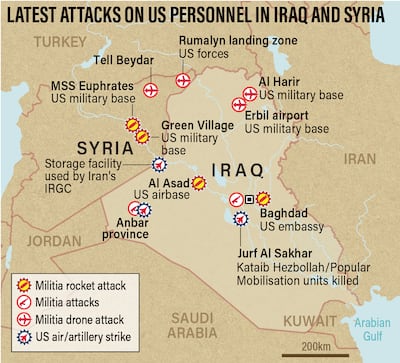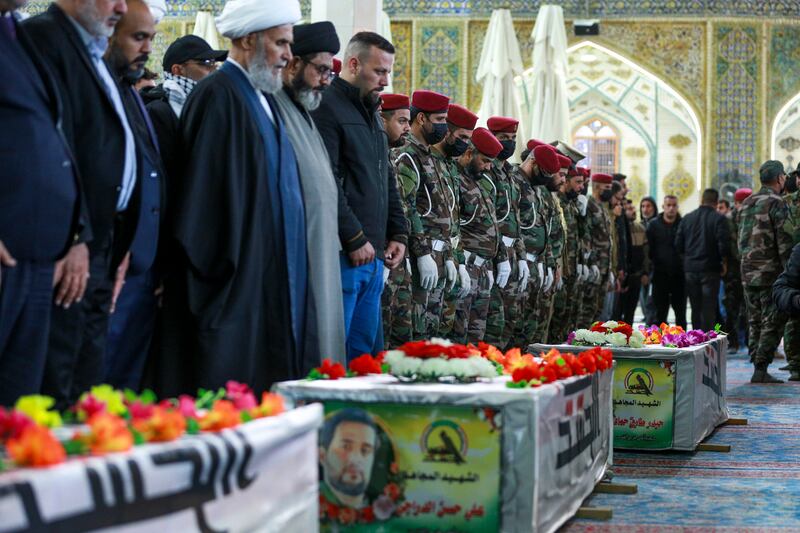Live updates: Follow the latest onIsrael-Gaza
The latest escalation between US forces and Iran-backed Shiite militias over the past three days in Iraq has put the government in a difficult position, security officials said on Thursday.
The officials, who spoke to The National on condition of anonymity due to the sensitivity of the issue, warned that the confrontation could escalate further, putting Iraqi security forces at risk.
US forces in Iraq and Syria have faced a surge in rocket and drone attacks by militia groups due to Washington's support of Israel's bombardment of the Gaza Strip, after Hamas operatives killed about 1,200 people, most of them civilians, in cross-border raids in Israel on October 7.
"These attacks are really embarrassing us," an Interior Ministry Intelligence officer said.
"At the same time, the government can't do anything to stop them as the key to these groups is not in Baghdad, but Tehran."
These attacks have hit Ain Al Asad in western Iraq, a military base near Baghdad's international airport, and Harir airport in the northern city of Erbil, as well as bases inside Syria.
As of Tuesday, US troops have been attacked 68 times since October 17, with 33 in Iraq and the rest in Syria, a defence official confirmed to The National on Wednesday.

At least 62 US personnel have suffered minor injuries or traumatic brain injuries in the attacks, according to the Pentagon.
As a retaliation, the US carried out three limited air strikes in Syria, and on Monday and Tuesday it expanded these attacks to Iraq in an alarming escalation, killing at least nine militiamen.
Iraqi militia groups have vowed to increase their attacks.
Late on Monday, US forces were attacked at Ain Al Asad and a US military AC-130 plane responded a few hours later, killing one Iran-backed militant linked to Kataib Hezbollah.
The following day, the US struck the operations centre of the same group in Jurf Al Sakhar, south of Baghdad, killing eight militants and wounding five.
"Since October 17, the government has been trying to convince these groups that their acts are harming Iraq and its relations with other countries, mainly the US, to no avail," another government official said.
A four-day temporary truce between Israel and Hamas was expected to come into force on Thursday to allow Israeli hostages to be swapped with Palestinian prisoners, and to deliver more humanitarian aid into Gaza.
The deal has been beset by delays, however.
"There are indications that Iran informed all factions in Iraq, Lebanon, Syria and Yemen to stop operations when the ceasefire and prisoner exchange agreement begins," the official said.
"We hope we can start from that point to stop these useless attacks."
The Iraqi government on Wednesday condemned the US strikes as a “dangerous escalation and a breach of Iraqi sovereignty”.
It said the strikes were a "clear overstepping” of the task of the US-led International Coalition, which is supporting Iraqi forces with training and advice.
But it also contained a hidden message to the militias, warning that the government “is the only party that is constitutionally responsible for drawing and implementing policies and maintaining security and stability".
"Any armed actions outside the military institution are deemed illegal and a threat to the national interests,” it warned.
A few hours after holding a funeral for the killed militants in Baghdad, the Islamic Resistance in Iraq, a network of Tehran-allied militias, said they fired three explosive-laden drones at Harir base in separate attacks.
On Wednesday night, Iraqi Deputy Prime Minister and Foreign Minister Fuad Hussein met the US ambassador to Baghdad, Alina L. Romanowski, emphasising the government's stance.
After the meeting, Ms Romanowski said they discussed "the latest regional developments and Iraqi government's commitment to protecting US presence in Iraq".
"We share common points of view on preventing the expansion of conflict and on delivering humanitarian aid to civilians to Gaza," she added.







